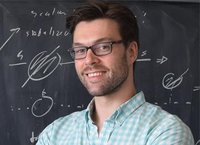David Curtin, an assistant professor in the Faculty of Arts & Science’s Department of Physics, and Canada Research Chair in Theoretical Particle Physics, is one of two Arts & Science recipients of the distinguished McLean Award for 2022.
The McLean Award is funded by the University of Toronto’s Connaught Fund and is given in support of basic research in physics, chemistry, computer science, mathematics, engineering sciences or statistical sciences. It is awarded to an outstanding researcher early in their career to assist in attracting and supporting graduate students and post-doctoral fellows as part of their research team.
“It’s a great honour to win the award,” says Curtin. “It’s wonderful validation of the research I’m doing and I’m very grateful for it.
“But I also see it as recognition of the amazing people already in my group,” he says, “and the incredible wellspring of motivated, talented undergraduates and graduate students that U of T attracts.”
The award will allow Curtin to fund a postdoctoral fellowship jointly with the Perimeter Institute. "One of my priorities has been to build up the collaboration between U of T and the Perimeter,” he says. “The new position will be great for science and for the collaboration between these institutions.”
Among Curtin’s current research interests are so-called “long-lived” or “ultra-stable” subatomic particles — which in the realm of particle physics means they live up to a second before decaying. He is co-founder and co-leader of the experimental collaboration MATHUSLA, the Massive Timing Hodoscope for Ultra-Stable Neutral Particles. The experiment will operate at the Large Hadron Collider (LHC) in Switzerland and is designed to detect these yet to be observed particles.
The MATHUSLA collaboration includes the Department of Physics’ Miriam Diamond as well as researchers from some two dozen universities, research institutes and high energy physics labs. And while they are still looking for all the dedicated funding the experiment needs, Curtin and his collaborators have recently received NSERC funding for MATHUSLA that will support several graduate students and postdoctoral fellowships, as well as instrumentation research and development.
“I’m excited to congratulate Professor Curtin on receiving the McLean Award and the valuable support it provides,” says Melanie Woodin, dean of the Faculty. “Through researchers like him, U of T is a partner in large, international collaborations that are making groundbreaking discoveries and I look forward to following MATHUSLA and his other research projects.”
Another current focus of Curtin’s is dark complexity, the idea that the constituents of dark matter are more than just inert, unseen particles that interact with other particles only through gravity. Instead, dark complexity describes them as particles not unlike ordinary matter in stars, molecules and humans — subject to non-gravitational forces like electromagnetism and those analogous to the nuclear forces that act on ordinary matter.
As he was with long-lived particles and MATHUSLA, Curtin is currently bridging the realms of theory and experiment in his research into dark complexity. For example, he is investigating how a star made of dark matter could be detected by astronomers.
Working with David A. Dunlap Department of Astronomy & Astrophysics’ Chris Matzner, Curtin has concluded that such dark stars would contain enough ordinary matter to emit very faint, albeit observable light. So, when astronomers find a star-like object that is much dimmer than even the dimmest ordinary stars, they will have found dark matter.
“My research in both long-lived particles and dark complexity are examples of the challenge in getting from fundamental theoretical principles to an experimental observation,” says Curtin. “It’s a complex problem and to get there, you have to collaborate with people outside your field of expertise. This is why I'm thrilled to be at U of T where this sort of collaboration is possible.”
Original article is available at: https://www.artsci.utoronto.ca/news/connaught-fund-mclean-award-winner-david-curtin
UofT Celebrates: https://www.utoronto.ca/celebrates/david-curtin-and-sophie-rousseaux-recognized-mclean-awards-2022

